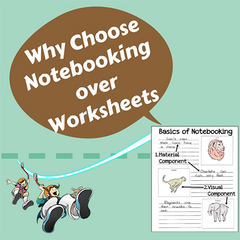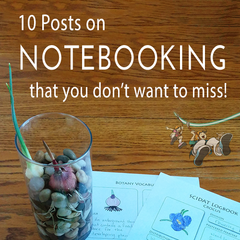FREE Shipping on all our products! (Please expect 1 to 1.5 weeks for delivery due to transit delays. We ship every day including Saturday
FREE Shipping on all our products! (Please expect 1 to 1.5 weeks for delivery due to transit delays. We ship every day including Saturday
14 Common Homeschool Science Questions (and the Answers) {Season 5 Recap}
November 18, 2019 5 min read

For season 5 of The Tips for Homeschool Science Show, we shared the answers to nine common questions we get about homeschool science. We wanted to put them all together in one place to make it easier for you and add 5 more questions and answers that we addressed in previous episodes.
Let's dig in...
14 Common Homeschool Science Questions (And the Answers)

Q1 - Why should I bother with homeschool science?
We kicked off the season with a whopper! In this first episode, we chatted about why you should bother with homeschool science in the first place!
Key Takeaway->We need to teach science for a variety of reasons and as homeschoolers, we have the chance to make science enjoyable, not intimidating!
Q2: What should a week with science look like?
In this episode, we took a closer look at what your week should look like for science. We briefly discussed the three key things you need to do each week for homeschool science.
Key Takeaway->As long as you are doing, gathering, and telling each week – you are hitting all the high points of what you need for science.
Q3: Should we combine for science?
To combine or not - that is the homeschool science issue we addressed in this season 5 question! In this podcast episode, we discussed the two factors you need to consider when deciding whether or not to combine for science.
Key Takeway->There are two key factors to consider before you decide to combine for science - the age of your students and their age gap.
Q4: Can you teach science without experiments?
Do you have to do experiments for science? Yes and no! In this podcast episode, we chatted about how it's possible to do science without experiments, as long as you do some kinds of hands-on science activities.
Key Takeaway->It is possible to teach science without doing experiments, but it is not possible to teach science without some kind of hands-on exploration.
Q5: How do we narrate and what should I expect?
If you are new to narration or if you struggle with knowing if you are doing it “right,” this episode is for you! We discussed what narration is, how you get your kids to narrate, and what to expect.
Key Takeaway->Don't get discouraged when your kids don't narrate like a pro from the very beginning.
Q6: Should I read science aloud to my homeschooled kids?
Should you read science aloud? Or should your homeschooled kids be reading their own science materials? In this episode, we shared the three steps to move through when reading science in your homeschool.
Key Takeaway->For science, you start by reading aloud to your students, as their reading skills develop they will read the materials with you, and finally, as their reading confidence grows, they can read their own science materials.
Q7: Should I teach one science discipline per year or multiple?
Should you teach biology all year long? Or should you teach a bit of biology, earth science, and physical science? We chatted about the benefits and downsides of sharing one discipline or multiple disciplines in science for each school year.
Key Takeaway->There are benefits and downsides to the mastery and spiral approaches for teaching science. In the end, what matters most is that you actually share science with your kiddos.
Q8: What is the heart of science education?
What is the core of what makes a lesson a science lesson? How do we know if we are really teaching science? In this episode, we discussed the heart of science education.
Key Takeaway->At its heart, science education is about providing opportunities for the mind to work.
Q9: What is the scientific method and how do I use it in my homeschool?
A mention of science education or STEM will almost always bring up a mention of the scientific method. In this episode, we talk about what the scientific method is and how we can incorporate it into our homeschools.
Key Takeaway->Allowing our students to interact with the steps of the scientific method through representations, hands-on experiences, and repeated applications will serve to firmly etch this foundational concept into their minds.
Q10: Do you have to love science to teach it?
If science wasn't your thing, can you really teach science to your own kids at home? In this episode, we answered this question and provided a dose of encouragement to help you teach homeschool science.
Key Takeaway->If science wasn't your thing, don't worry --> get a good curriculum!
Q11: What does science look like for the classical educator?
Normally when one thinks of classical education for homeschool, they equate it with literature, Latin, and history-rich studies. Science is often seen as an afterthought or as a weak, book-centered addition to a typically rigorous curriculum plan. In this episode, we discuss what classical science can look like in your homeschool.
Key Takeaway->Classical science does not follow the typical state standards in order. That said, if you complete the cycle, you will cover all the same topics plus a bit more.
Q12: Can babies, toddlers, and science mix?
Are you getting ready to add a baby into the mix? These are precious times and we do need to slow down and savor them because they pass so quickly! So, does that mean that we should stop teaching science to our older set during this fleeting window? Not necessarily! Listen in as we share a few tips with you to help you continue to teach science even with little ones underfoot.
Key Takeaway->One way that helped me to mix babies, toddlers, and science was to have short lessons with lots of breaks.
Q13: What do you do when you are behind in science in your homeschool?
At one of the conventions we attended, a woman took me aside and whispered to me, “I have a confession to make – we haven’t done any science in weeks. What am I supposed to do?” In this episode, I shared my answer with you all because I know that this lady was not the only one out there who has been behind in their plans for science!
Key Takeaway->The point of acknowledging where you are at is NOT to make you feel guilty about what you haven’t done. The point is to provide you with the information you need to change the story moving forward.
Q14: Do you really have to do a science fair project?
Few things strike fear into the hearts of parents like the science fair project. And I believe that the fear is rooted in a lack of knowing how to approach a science fair project – after all it seems like a huge assignment to complete. In this episode, we chat about why it is important to do a science fair project with your students.
Key Takeaway->The science fair project is the best way for our students to practice the scientific method from start to finish.
Wrapping it up
Well, that's a look at season 5 of the Tips for Homeschool Science Show. If there's a question you want to be answered or a topic you want to be covered in future episodes, let us know in the comments below!
Also in Elemental Science Blog
What is the difference between a report and a research paper for science?
May 13, 2024 2 min read

In the middle school and high school years, students frequently receive assignments for research papers or reports in science and history. But what is the difference? And how to you go about writing both of these? Click "Read More" to get answers.
Why Choose Notebooking over Worksheets? Here are 3 Reasons...
May 06, 2024 2 min read

Why choose notebooking over worksheets? Click "Read More" to see three reasons why we have chosen notebooking over worksheets.
10 Posts On Notebooking That You Don’t Want To Miss
April 22, 2024 3 min read

We love notebooking at Sassafras Science! And these ten posts on notebooking will help you understand the how's and why's of this super effective tool.
Subscribe
Sign up to get the latest on sales, new releases and more …

